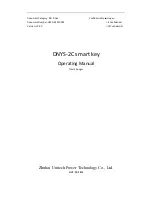
ECG
11-11
ST segment analysis
Overview
The ST value, analyzed by the monitor, shows the difference of electrical activity between ISO
and ST points.
Myocardial ischemia appears in the ECG as an ST segment deviation from the isoelectric line
(ISO point). The ST segment generally rises above the PQ isoelectric line in the presence of
transmural ischemia and is pressed below the isoelectric line in the subendocardial ischemia.
NOTE: ST segment changes may also be affected by such factors as drugs or
metabolic and conduction disturbances.
NOTE: The significance of the ST segment changes needs to be determined by a
physician.
Display of ST
Figure 11-6 ST number field
(1) Message
field
(2) ST values of ECG1, ECG2, and ECG3
(3) Fourth ST value showing the largest absolute ST value
(4) Lead
label
NOTE: ST segment deviations are not displayed if the patient has a ventricular
pacemaker in use.
Monitoring the ST segment
The monitor analyzes ST for all measured leads and gives ST trends separately for each lead.
Numerical ST data is shown to the right of the second real-time ECG waveform field.
You can also select numerical ST data to the lower digit field. Press the
Monitor Setup
key
and select
Screen Setup - Digit Fields
. Select ST data to the field you prefer.
The ST analysis starts automatically after the leads have been connected and the QRS
detection has started. During a learning period of 32 accepted beats the median ST values are
displayed. Also, when the cable or the V lead is changed, or when an electrode is removed, or
relearning is started manually, the monitor starts to learn the ST segment.
NOTE: If the patient has an atrial pacemaker, ST calculations can be performed if the pacer
spike does not coincide with the ISO point’s adjustment range.
Summary of Contents for b30
Page 2: ......
Page 8: ......
Page 10: ...Table of contents ii...
Page 12: ...Table of contents ii...
Page 16: ...B30 Patient Monitor 4...
Page 18: ...Table of contents ii...
Page 26: ...Table of contents ii...
Page 62: ...B30 Patient Monitor 2 36...
Page 64: ...Table of contents ii...
Page 72: ...Table of contents ii...
Page 90: ...Table of contents ii...
Page 106: ...Table of contents ii...
Page 118: ...B30 Patient Monitor 6 12...
Page 120: ...Table of contents ii...
Page 124: ...B30 Patient Monitor 7 4...
Page 126: ...Table of contents ii...
Page 136: ...Table of contents ii...
Page 144: ...B30 Patient Monitor 9 8...
Page 146: ...Table of contents ii...
Page 156: ...Table of contents ii...
Page 176: ...Table of contents ii...
Page 184: ...B30 Patient Monitor 12 8...
Page 186: ...Table of contents ii...
Page 192: ...Table of contents ii...
Page 202: ...Table of contents ii...
Page 212: ...B30 Patient Monitor 15 10...
Page 214: ...Table of contents ii...
Page 224: ...B30 Patient Monitor 16 10...
Page 226: ...Table of contents ii...
Page 236: ...B30 Patient Monitor 17 10...
Page 241: ......
















































